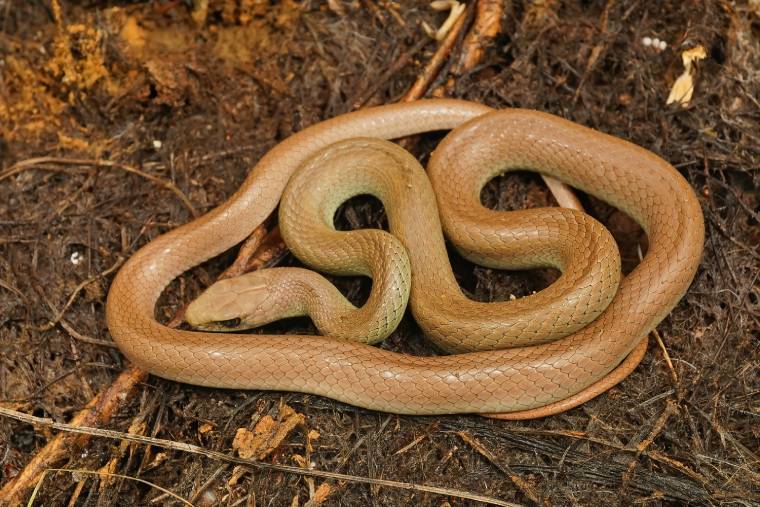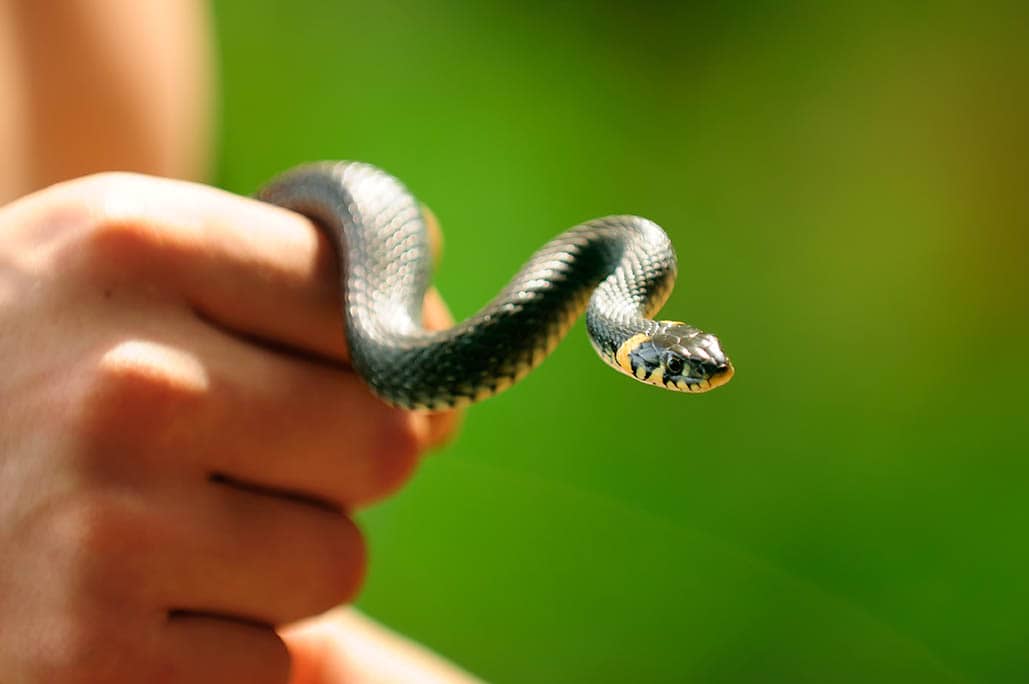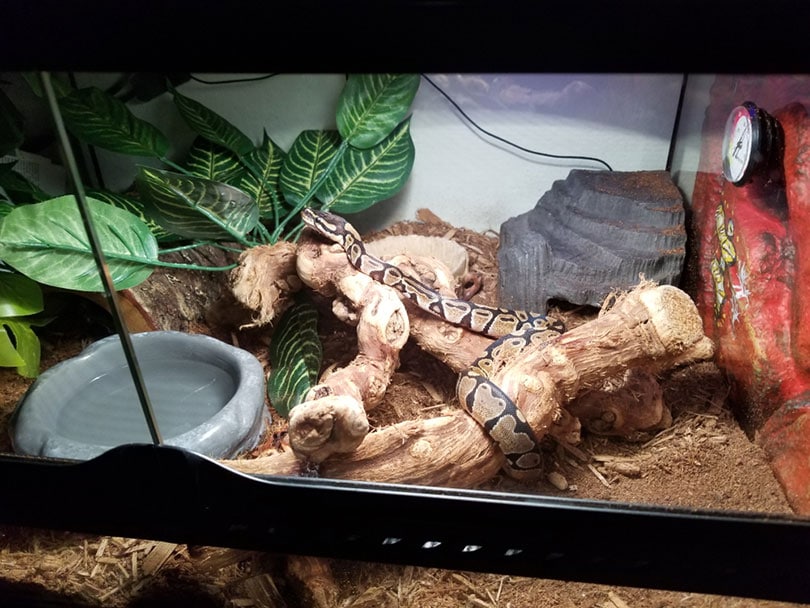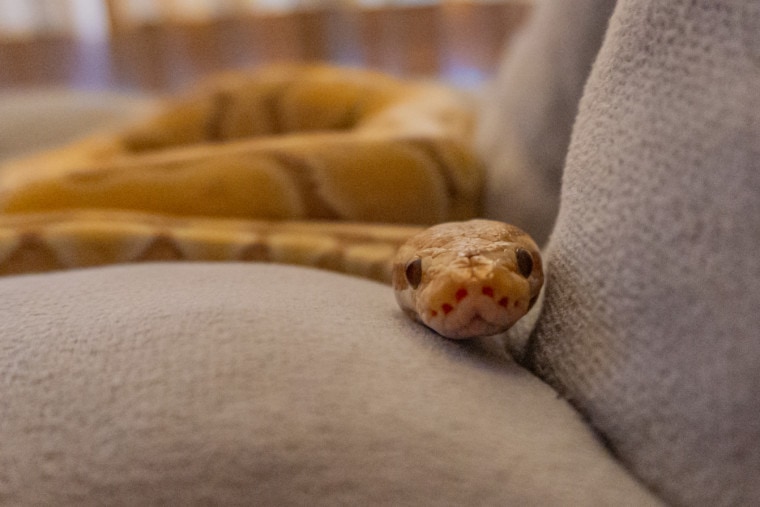
Snakes have made commendable progress towards domestication, primarily since they’ve been successfully bred for gentleness, alongside fabulous patterns and color morphs. This has made them loveable and domestic-worthy reptiles.
However, breeders will never be able to breed out the snake’s instinct to bite completely. This means that there’s always a chance for even the most docile snake to become defensive and bite you if it feels threatened. All snakes bite, especially if they are excessively hungry, moody, or startled.
It’s just that some don’t bite as often as others. Read on to know more about snakes that rarely bite.
The 8 Pet Snakes That Are Least Likely to Bite
Some snakes have “alternative” defense mechanisms they use instead of biting. Others are just generally laid-back and have relaxed temperaments when around humans.
They include:
1. Rubber Boas
Practitioners always use a Rubber Boa in therapy treatments for anyone that fears snakes and wants to overcome the phobia. This tells you a lot about this snake’s personality.
Rubber Boas are so friendly, gentle, and curious that they always innocently approach humans or even predators in the wild. Unfortunately, while this gesture is super sweet, it means that these snakes often get senselessly killed by predators and humans who mistake them for harmful snakes.
These snakes are not venomous and have fangs that they rarely use.
2. Rosy Boa

Rosy Boas rarely nip at humans and aren’t venomous, so you can always get them. They are also gentle, easy to care for, and one of the slowest snakes you’ll ever find.
These snakes are ambush hunters, though. They love to burrow in the sand, waiting to pounce on their prey item. So it would be best not to disrupt your pet once it’s in ambush mode because it’ll try to strike as you elicit its feeding response.
You might want to know that Rosy Boas stay small forever!
- Related Read: 10 Rosy Boa Morphs & Colors (with Pictures)
3. Ball Python
Ball Pythons are large docile snakes that also tend to be laid-back and not so active, which is the reason they are snake owners’ favorite pets.
This snake breed is less likely to interact with you when it’s in its tank, although it wouldn’t mind being handled and showing affection. This is, of course, with the right owner who has established a trust foundation with the reptile.
Your Ball Python is less likely to bite because it has adopted an alternative self-defense mechanism. It tends to curl up into a small ball as much as possible when threatened, thus its name “ball python.”
It’ll wrap itself into coils tightly and tuck the head and neck in to ensure that the threat doesn’t reach its most vulnerable parts.
No other snake defends itself in this manner. Others mostly coil up into an S-shape and get the fangs out, ready to strike when feeling threatened.
- See Also: Python vs Boa: What’s the Difference?
4. Western Hognose Snake

This snake’s upturned pig-like snout makes it arguably the most enchanting of all snake breeds. Plus, Western Hognose snakes are docile and rarely ever try biting their owners.
These snakes are among the snakes with alternative defense tactics. It will roll over on its back and stick out its tongue to play dead when it feels threatened. It’s so clever that if you flip it back upright, it’ll roll over again as if to prove that it’s dead.
Western Hognose snakes are technically venomous. However, there is no need to worry, as the venom is only meant for their prey items and not humans. If they bite, it might hurt just a little bit or get a slight swelling at worst.
5. California King Snake
Also known as “Cali Kings” by serpent enthusiasts, these reptiles are generally friendly, although they can be flighty, active, and nervous when young.
They also tend to be escape artists. So, you might want to invest in clamps for your mesh lid if you don’t want to stumble on your pet in your bedroom. However, adult California Kingsnakes are peaceful and never aggressive unless you aggravate them.
6. Corn Snakes
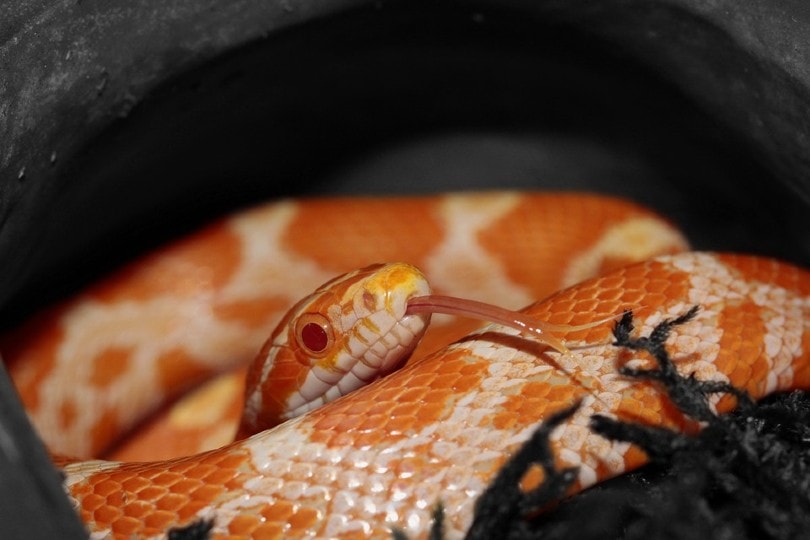
Corn snakes are among the most commonly owned snakes, and it’s for a good reason. They are super friendly and easy to care for.
Corn snakes rarely bite, are non-venomous, docile, and non-threatening to novice owners and even kids.
7. Sunbeam Snake
Sunbeams must be the most beautiful snake ever! You should see their incredible rainbow reflecting skin that makes them interesting to look at. Their small sizes also make them very approachable.
These snakes are shy and love to burrow, so they are often elusive. However, Sunbeams are social and usually warm up to humans once they enjoy being handled.
They are also non-venomous and non-aggressive, so you shouldn’t fear potential biting as long as you treat them right.
8. Kenyan Sand Boa

These snakes are less common pets. However, they are easy-going, non-venomous, and less likely to bite humans.
Kenyan Sand Boas don’t have volatile temperaments, although you must understand that each snake has a unique character, and non-sensible handling will lead to nipping.
This snake is only likely to nip at a human as a feeding response. Always remember to keep it fed and happy.
Generally, Kenyan Sand Boas enjoy being handled. Just ensure that you pick it up from its body’s center for extra support because it has a heavier midsection.
It would also be best to approach your pet from a position where it’s able to detect your scent and realize that you aren’t a threat.
Why Do Snakes Bite?
A snake won’t bite you often if you are providing for its needs and handling it properly. However, every long-term snake owner has experienced occasional bites. Here’s why these reptiles bite.
1. Feeling Fearful
Snakes are obligate carnivores and prey animals. They are often fearful of unfamiliar large animals, including humans, so your snake will bite you if it’s not used to being around you.
This reptile can also bite if you mistreated it in the past. It’ll never forget and will associate your scent with the bad experience and try to defend itself by biting.
2. It’s Hungry
A starving snake has a right to think that anything on its path is food. So it might start striking at anything it meets, including your hands.
It can accidentally bite you when lashing out to grab prey from your hands.
Your snake can also bite, especially if you had initially handled meat before reaching out to it and your hands still have the scent. Just ensure to keep your pet snake well-fed, and it won’t bite you more often.
3. It’s Irritated
Snakes also get irritated, especially if they have an underlying illness and are feeling unwell. They can also lash out when they are shedding or moody.
- Related Read: Do Snakes Like Being Pet? Everything You Need To Know!
Final Thoughts
Potential snake keepers should understand that just because a snake is for sale doesn’t mean that it’s tame. These pets can trust but can’t “love” or feel “affection” for you like cats and dogs. Although there are some snakes that have a tendency to bite less than others, there aren’t any snakes that don’t bite at all.
Snakes retain their wild instincts and will always bite to defend themselves if provoked. However, these are some of the more docile snakes to keep as pets that rarely bite unless they feel like they need to.
Featured Image Credit: TKBackyard, Shutterstock

